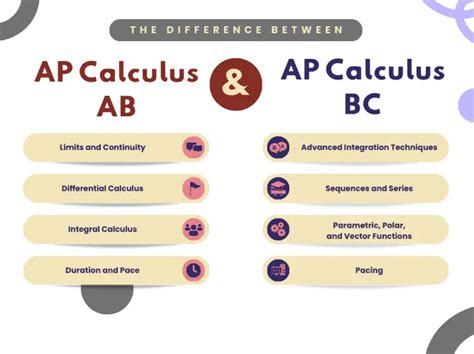Introduction

Calculus, a branch of mathematics, has a pivotal role in STEM fields, engineering, economics, and data science. Students seeking to pursue these disciplines often have the choice between two AP Calculus courses: AB and BC. This article aims to provide an in-depth comparison between Calculus AB and Calculus BC, assisting students in making informed decisions about their academic trajectory.
Curriculum Overview
Calculus AB
- Covers single-variable calculus
- Includes topics such as limits, derivatives, integrals, and applications of integration
- Examines polynomial, rational, exponential, and logarithmic functions
Calculus BC
- Encompasses the Calculus AB curriculum
- Extends to multivariable calculus
- Introduces concepts like vectors, parametric equations, polar coordinates, series, and differential equations
Course Content
Limits and Continuity
- AB: Defines limits and continuity; explores algebra of limits and limit laws
- BC: Extends AB to examine limits involving infinity and the concept of discontinuities
Differentiation
- AB: Introduces derivatives and differentiation techniques; applies them to find rates of change and extrema
- BC: Builds on AB to explore implicit differentiation, related rates, and higher-order derivatives
Integration
- AB: Covers indefinite and definite integrals; emphasizes techniques like substitution and integration by parts
- BC: Extends AB to include integration by partial fractions and improper integrals
Applications of Calculus
- AB: Explores applications in optimization, related rates, and physics
- BC: Expands on AB applications to include volumes, surface areas, and differential equations
Additional Topics in Calculus BC
- Vectors: 2D and 3D vectors; operations and applications
- Parametric Equations: Functions that represent curves in 2D or 3D; derivatives and integrals
- Polar Coordinates: Alternative coordinate system for 2D points; converting equations and calculating areas
- Series: Sequences and series; convergence tests and power series
- Differential Equations: Equations involving derivatives and functions; methods for solving them
Exam Structure
The College Board offers two separate AP Calculus exams: AB and BC. The exams differ in their duration, content coverage, and scoring format.
Duration and Format
| Exam | Duration | Questions |
|---|---|---|
| Calculus AB | 3 hours | 45 multiple choice; 6 free response |
| Calculus BC | 3 hours | 50 multiple choice; 6 free response |
Content Coverage
| Exam | Topics Covered |
|---|---|
| Calculus AB | All Calculus AB curriculum topics |
| Calculus BC | All Calculus AB and Calculus BC curriculum topics |
Scoring
The AP Calculus exams are scored on a scale of 1-5, with 5 being the highest possible score. The College Board provides a detailed breakdown of the scoring criteria for each exam.
Course Difficulty
The difficulty of Calculus AB and Calculus BC varies depending on the student’s mathematical background and abilities. Generally:
- Calculus AB is considered a challenging but accessible course for students with a strong foundation in algebra and pre-calculus.
- Calculus BC is more demanding and requires a deeper understanding of mathematical concepts.
Who Should Take Calculus AB vs. Calculus BC?
The choice between Calculus AB and Calculus BC depends on the student’s goals and future academic pursuits:
- Students planning to major in mathematics, science, or engineering should consider Calculus BC as it provides a more comprehensive foundation.
- Students intending to major in other fields, such as business or humanities, may find Calculus AB sufficient.
- Students interested in exploring multivariable calculus and advanced mathematical concepts should opt for Calculus BC.
Benefits and Opportunities
Taking AP Calculus offers numerous benefits:
- College Credit: Passing an AP Calculus exam can earn college credit and exemption from introductory calculus courses in many universities.
- STEM Preparation: Calculus is essential for success in STEM fields, providing a solid foundation for higher-level math and science courses.
- Problem-Solving Skills: Calculus develops critical thinking and problem-solving abilities, applicable to a wide range of disciplines.
- Intellectual Stimulation: The study of calculus challenges the mind and sparks intellectual curiosity.
Conclusion
Calculus AB and Calculus BC are valuable high school courses that provide students with a strong foundation in mathematics. While both courses have their advantages, the choice between them should be guided by the student’s individual goals and aspirations. By carefully considering the course content, exam structure, and benefits, students can make informed decisions about their mathematical journey and set themselves up for success in higher education and beyond.
